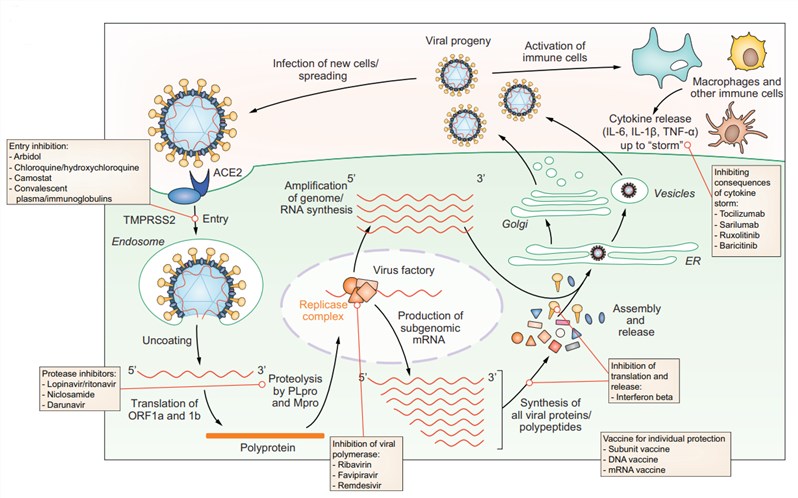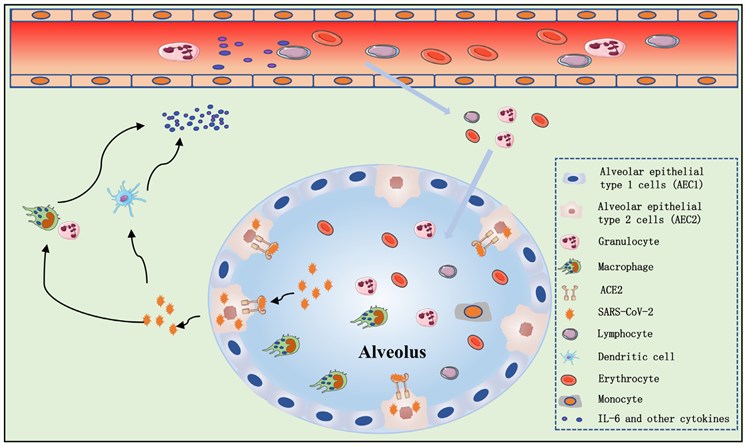All products and services are For Research Use Only and CANNOT be used in the treatment or diagnosis of disease.
Cytokine release syndrome (CRS) is a systemic inflammatory response caused by autoimmune diseases, infection, administration of immunotherapy, and antibody-based therapy. This syndrome is characterized by dramatically increased levels of cytokines and immune system dysregulation. Laboratory results show elevated inflammatory cytokines such as interleukin (IL)-2, IL-6, TNF-alpha, and nonspecific markers of inflammation such as C-reactive protein (CRP), ferritin, D-dimer, and fibrinogen. CRS is commonly seen in severe cases of COVID-19. Elevated ferritin, CRP, and IL-6 are suggested as predictors of respiratory failure and fatality. Scientists have suggested that macrophages and dendritic cells (DCs) release cytokines (such as IL-12, IL-15, and IL-18) after viral antigen recognition. Besides, activated natural killer cells (NKs), recruited group 1 innate lymphoid cells, and differentiated type 1 helper cells may enhance the production of cytokines (such as IL-1, IL-2, TNF-α, and IFN-γ), which can induce injury of respiratory epithelial and endothelial cells and lead to a variety of respiratory symptoms.

Fig.1 Targets for COVID-19 drug development. (Asselah, 2020)
COVID-19 is transmitted when the SARS-CoV-2 virus infects the respiratory tract and in severe cases leads to acute respiratory distress syndrome. However, the high mortality rate in COVID-19 patients has been linked to the CRS. Currently, there are hundreds of active clinical programs focused on developing and repurposing therapeutic drugs for the treatment of COVID-19. IL-6 is implicated as an important mediator of COVID-19-associated CRS. CRS in patients with COVID-19 has prompted consideration of anti-cytokine therapies, particularly IL-6 antagonists.
Tocilizumab, a humanized monoclonal antibody (mAb) against the IL-6R, blocks IL-6 signaling and reduces inflammation. Canakinumab blocks the production of IL-1 protein, preventing a possible deadly overreaction of the immune system in COVID-19 patients. Besides, predicted antiviral and cytokine-storm-attenuating mechanisms could be combined in one drug. For example, Zafirlukast could be potent against COVID-19 both due to its predicted antiviral properties and its ability to attenuate the CRS. Thus, these two critical mechanisms of action may be combined in one drug as a novel and promising pharmacotherapy.

Fig.2 Possible mechanism of CRS in severe COVID-19 patients. (Chi, 2020)
Creative Biolabs provides cell-based assays to accelerate your COVID-19 CRS management and drug discovery in the basic research area, particularly in managing proinflammatory cytokine detection. Researchers can also adopt our array-based methods to analyze a range of cytokines of interest in one experiment either quantitatively or semi-quantitatively. In parallel to broad cytokine analysis, you might prefer to focus on a small number of cytokines of interest. Conventional ELISA tests are ideal mainly for biomarker validation or later in the clinical stages to evaluate the expression dynamics of human cytokines.
Please contact us for more information about the different assays or services that are available to support your programs.
References
For any technical issues or product/service related questions, please leave your information below. Our team will contact you soon.
 NEWSLETTER
NEWSLETTER
The latest newsletter to introduce the latest breaking information, our site updates, field and other scientific news, important events, and insights from industry leaders
LEARN MORE NEWSLETTER NEW SOLUTION
NEW SOLUTION
CellRapeutics™ In Vivo Cell Engineering: One-stop in vivo T/B/NK cell and macrophage engineering services covering vectors construction to function verification.
LEARN MORE SOLUTION NOVEL TECHNOLOGY
NOVEL TECHNOLOGY
Silence™ CAR-T Cell: A novel platform to enhance CAR-T cell immunotherapy by combining RNAi technology to suppress genes that may impede CAR functionality.
LEARN MORE NOVEL TECHNOLOGY NEW SOLUTION
NEW SOLUTION
Canine CAR-T Therapy Development: From early target discovery, CAR design and construction, cell culture, and transfection, to in vitro and in vivo function validation.
LEARN MORE SOLUTION